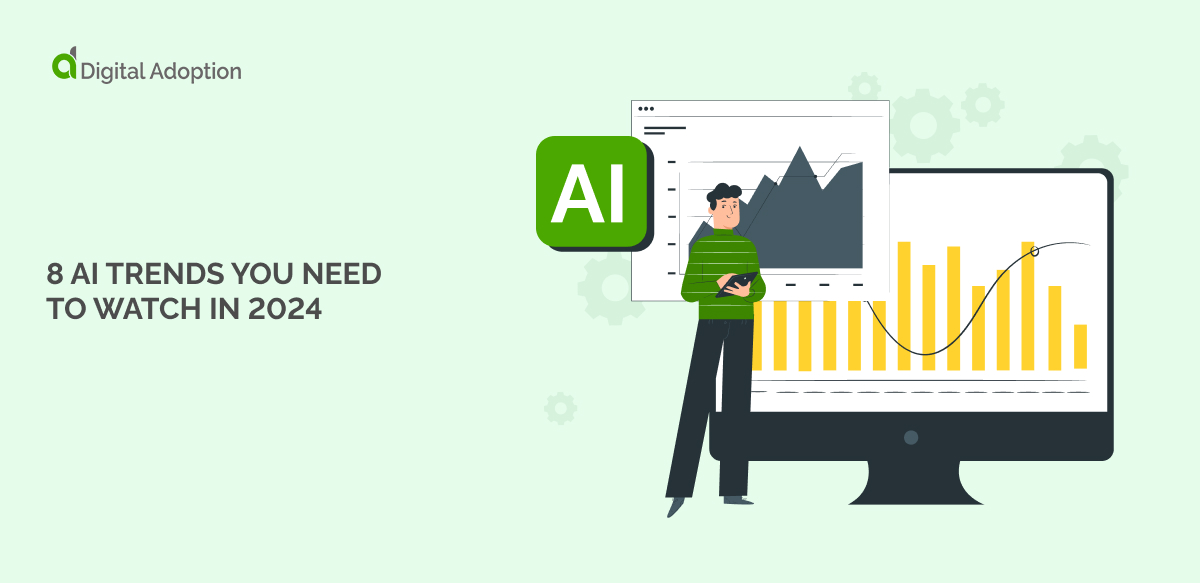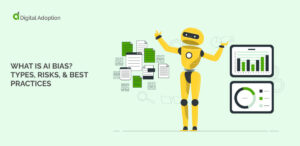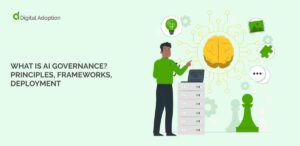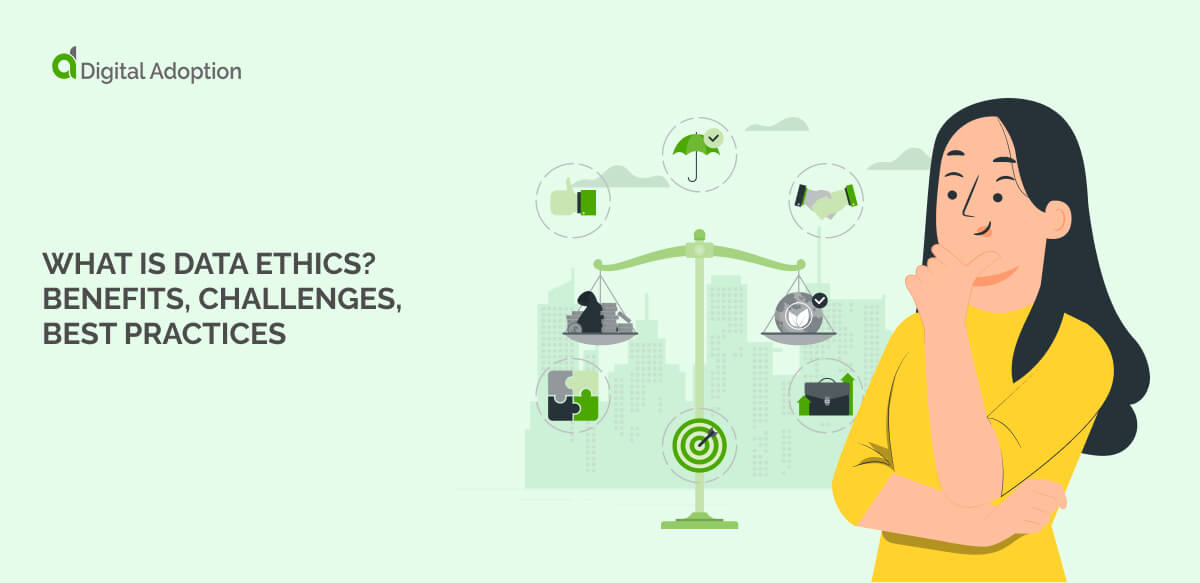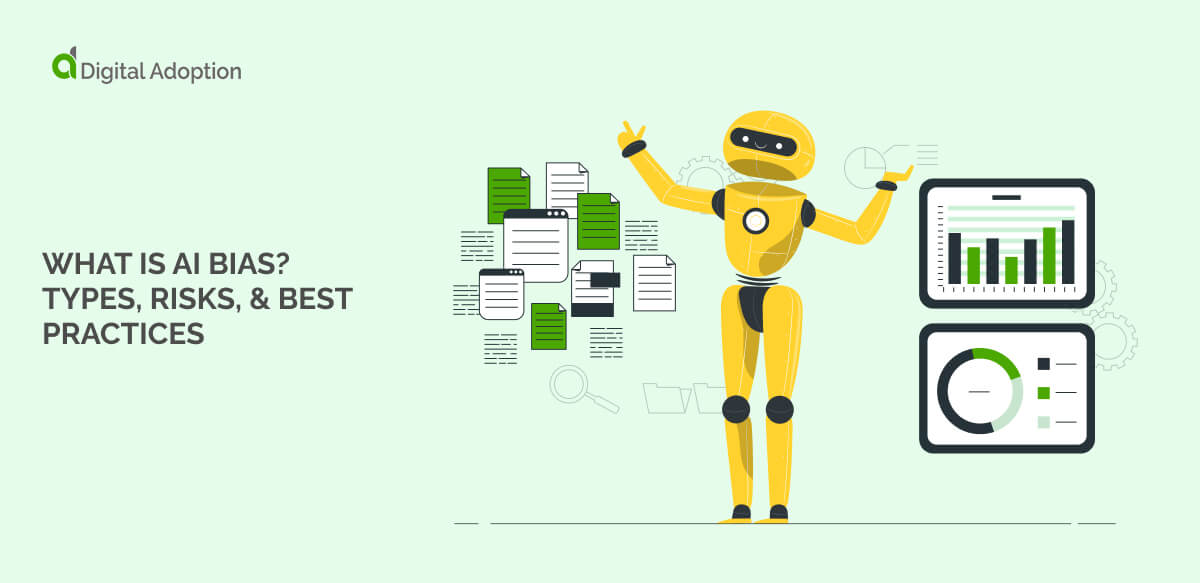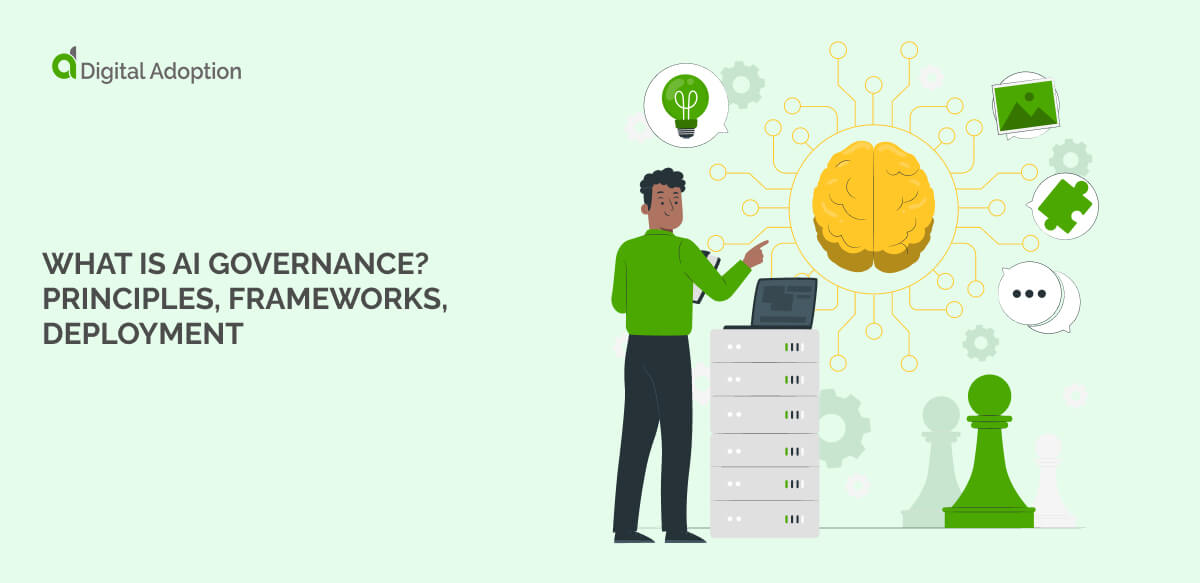At the end of 2022, some thought that generative AI was a bubble that would quickly burst.
We’re in a very different place today. As we usher in 2024, the landscape of artificial intelligence (AI) has undergone significant transformations since the beginning of the boom in 2023. The initial hype surrounding AI is starting to give way to a more nuanced understanding of its potential and challenges.
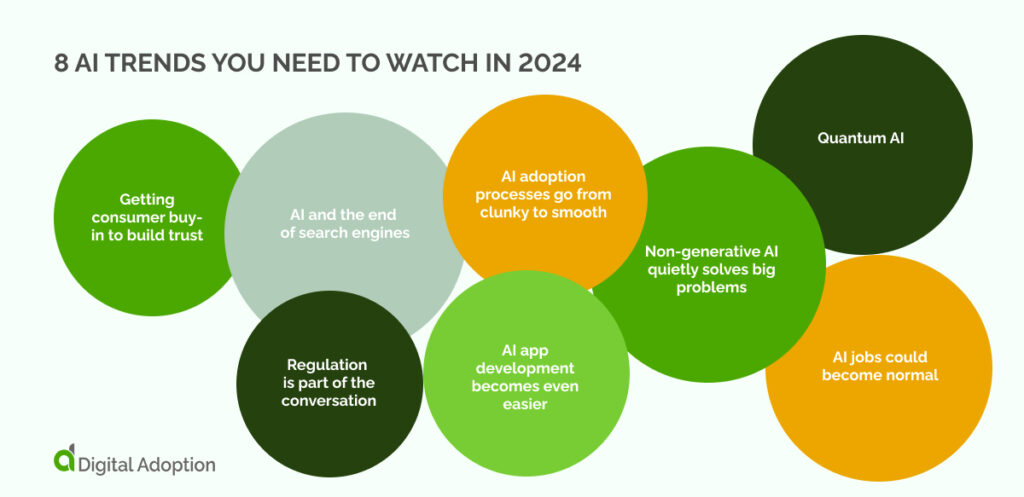
This article looks at the key AI trends poised to shape the year ahead. In our view, you need to watch the following eight things:
- Getting consumer buy-in to build trust
- AI and the end of search engines
- Regulation is part of the conversation
- AI adoption processes go from clunky to smooth
- AI app development becomes even easier
- Non-generative AI quietly solves big problems
- AI jobs could become normal
- Quantum AI
There’s no crystal ball to tell the future of AI. But as AI technologies become increasingly widespread, business leaders should be poised to take advantage of this AI revolution.
- 1. Getting consumer buy-in to build trust
- 2. Is this the End for Search Engines?
- 3. Regulation is Part of the Conversation
- 4. AI adoption processes go from clunky to smooth
- 5. AI app development becomes even easier
- 6. Non-generative AI quietly solves big problems
- 7. AI Jobs Could Become Normal
- 8. Quantum AI
- AI Trends for 2024: Getting over the hype
1. Getting consumer buy-in to build trust
The general public has had a mixed response to AI ever since it started churning out prize-winning artworks, episodes of Senfield, and suspiciously effective blog posts.
While sparking enthusiasm for the potential in work, creativity, and leisure, AI also raises concerns. Many harbor fears about the risks it may pose in the future workplace.
In 2024, AI-based organizations must do more to reassure their consumers. At the end of 2023, a team of Australian researchers defined it precisely: “People involved in every stage of developing and using AI need to get accustomed to asking themselves: do consumers and communities agree this is a justified use of AI?”
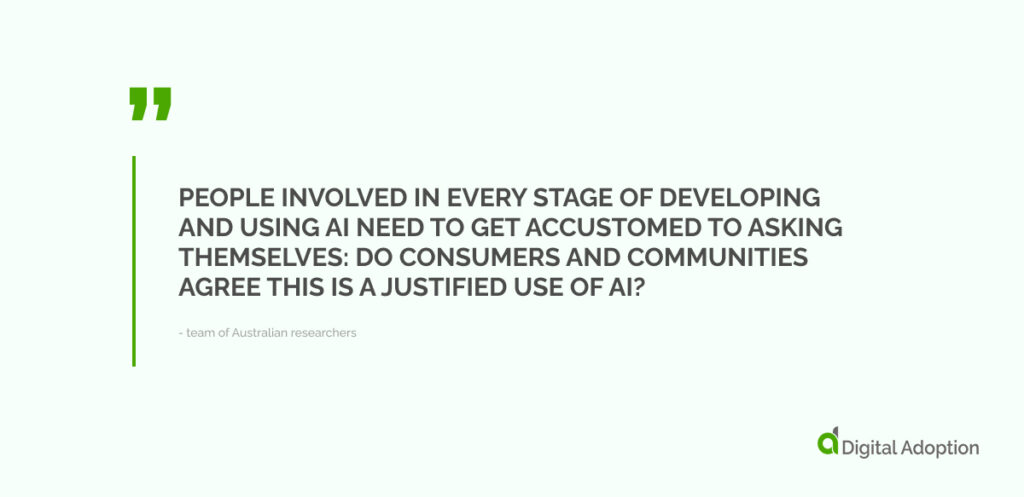
The question applies to data privacy, life-threatening use cases, and more.
2. Is this the End for Search Engines?
As 2023 grinds to a close, Google’s Search Generative Experience is promising an astonishing change in the online experience of internet users. SGE is figuring out how to post AI-generated answers prominently displayed above search results, with users benefiting from quick and concise overviews of their queries.
This approach aligns with the trend toward more visual and personalized search experiences, offering a dynamic interaction where users can engage in natural, conversational queries and receive visually appealing information. Striking a balance between fluid responses and factual accuracy, SGE aims to instill trust by providing reliable answers.
The system actively links to publishers, fostering a healthier linking strategy than previous AI models and emphasizing the importance of information quality. In essence, the Search Generative Experience represents a convergence of AI, search, and user interaction trends, offering a glimpse into the future of information retrieval.
3. Regulation is Part of the Conversation
With generative AI’s rising popularity, many legal issues emerge. Companies heavily reliant on AI must be vigilant, addressing concerns ranging from data challenges and tort liability to insurance, ensuring compliance with the law.
In 2024, one of the major trends will be AI regulation, which Alina Patelli of Aston University defines as a “comprehensive set of rules prescribing how this technology should be developed and used to address its potential harms.”
We saw the global discussion start at the UK’s Bletchley Park conference in November 2023. However, the precise regulation landscape will be different from government to government.
To prepare, AI leaders should be mindful of existing laws addressing AI legal issues, such as the European Union’s GDPR and the California Consumer Privacy Act (CCPA). Following these regulations, which focus on securing and protecting personal data, can help mitigate privacy concerns and other legal risks associated with AI usage.
4. AI adoption processes go from clunky to smooth
The challenges of AI adoption have involved problems with skills, cost, lack of tools, data complexity, and project complexity – to name just a few. It’s a difficult mix. Even if the technical problems are solved, the digital transformation issues are new and untested.
The pace of progress in IT processes is steadily increasing. A new wave of IT professionals who understand both challenges and advantages is emerging. Notably, IT service management (ITSM) guidance is adapting to incorporate the transformative potential of generative AI.
As we move forward, the spectrum of business applications for AI is becoming markedly clearer, surpassing the clarity achieved in the landscape back in 2022.
In 2024, it’s unlikely that we’ll finally find the “magic bullet” for solving all of your AI adoption problems. But after the rocky road of 2023, the digital transformation professionals of 2024 will have a much easier journey.
5. AI app development becomes even easier
Although AI is an incredibly complex area of computer science, people love generative AI because of its simplicity. Not everyone can understand how it works. But anyone who can access a computer can use it!
And thanks to effective APIs, in 2023, developers have been able to spawn their own generative AI tools. In 2024, developments like GPT Store are poised to make it even easier to use ChatGPT spin-offs.
The GPT store will be an online marketplace targeted at AI app builders. It will allow developers to access and share applications, tools, or models built using OpenAI’s GPT technology. For OpenAI, this is a key monetization strategy. And for end-users, it creates opportunities to use AI solutions in various ways.
AI might become more confusing in the near future, but its benefits will be even more exciting!
6. Non-generative AI quietly solves big problems
Generative AI has certainly taken the limelight, but it’s crucial to remember that it’s just one facet of Artificial Intelligence. While generative AI captures attention with its creative applications, non-generative AI quietly addresses significant challenges across various domains.
Beyond their creative potential, AI systems play a pivotal role in pragmatic problem-solving. Teal-world applications demonstrate the profound impact of AI in areas such as conflict resolution, health diagnoses, and security.
At the end of 2023, a prime example highlighting the practical impact of AI is found in the realm of climate change. Silicon Valley startup ClimateAi employs artificial intelligence to assess the vulnerability of crops to warming temperatures. By analyzing climate, water, and soil data, the platform provides valuable insights for farmers, helping them adapt to changing conditions. In one instance in Maharashtra, India, ClimateAi’s simulations guided tomato producers, resulting in a 30% increase in resilience by changing seed varieties and planting times.
These outcomes are important for the whole world. If you’re thinking about the future of AI, make sure you look widely across the field.
7. AI Jobs Could Become Normal
The rise of AI has sparked concerns about the future of employment, particularly among those at the lower echelons of corporate hierarchies. However, a counterargument posits that the future of work lies in individuals adept at utilizing AI technologies. This shift is evident across diverse fields, where specialized applications of prompt engineering gain prominence. Freelancers, in particular, stand to benefit as they leverage AI to enhance their processes, minimizing oversights and increasing efficiency.
Moreover, the implementation of AI introduces a spectrum of non-technical jobs. Roles in AI regulation, management structures, and addressing shadow AI practices emerge, demanding professionals with a contemporary and nuanced understanding of AI. These non-technical positions underscore the evolving employment landscape, demonstrating that as AI advances, so does the demand for individuals skilled in navigating its ethical, regulatory, and operational dimensions.
8. Quantum AI
Quantum AI, or quantum artificial intelligence, refers to the intersection of quantum computing and artificial intelligence. Quantum computing leverages the principles of quantum mechanics to perform computations using quantum bits or qubits, which can exist in multiple states simultaneously. This allows quantum computers to process information in ways that classical computers cannot, potentially solving certain complex problems much faster.
In the context of AI, quantum computing promises to significantly enhance AI algorithms’ capabilities. Quantum AI aims to leverage the unique properties of quantum computers to improve the efficiency of tasks such as optimization, machine learning, and pattern recognition. Quantum algorithms, like Grover’s and Shor’s algorithms, have been proposed to address specific problems in AI more efficiently than classical algorithms.
Like quantum computing, the applications of quantum AI are still in their infancy. But in the next few years, we can expect to see a whole raft of new applications emerging from this system.
AI Trends for 2024: Getting over the hype
AI’s evolution in 2024 serves as a pivotal chapter within an ongoing narrative of future trends.
Despite the rapid pace of technological progress, generative AI has yet to reach maturity in specific sectors, let alone across diverse industries.
Gartner’s 2023 analysis places Generative AI at the “peak of inflated expectations,” signaling its untapped potential. A ten-year wait is projected before achieving the coveted “plateau of productivity.” While awaiting this future milestone, the landscape is ripe with captivating experiments.
Beyond being inherently intriguing, these experiments offer valuable insights that contribute to the ongoing evolution of AI. They serve as critical waypoints, shaping our understanding and utilization of AI in the years ahead.
Therefore, the unfolding developments in 2023 stand not only as a reflection of the current state of AI but as a precursor to the transformative possibilities that await in the broader context of future trends.
As we navigate this journey, these experiments become essential guides, providing tangible markers on the path to unlocking the full potential of AI.

